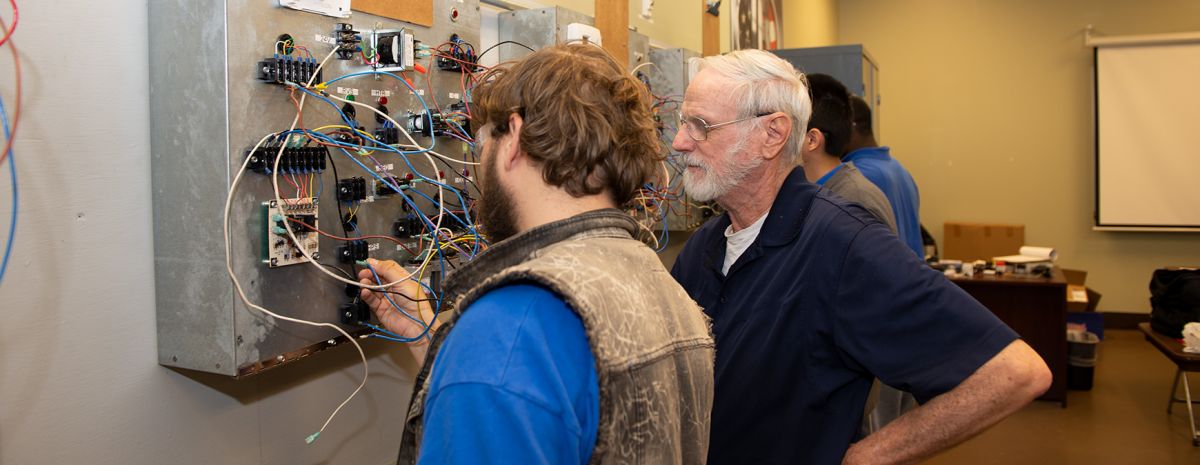RSI is a Great Training Option for Everyone
Learn more about how we can prepare you to advance your career.
Are you ready to become an HVAC technician and want to know your program options? This article reviews the three programs that The Refrigeration School (RSI) offers and what you will learn during each.
What are My HVAC Program Options?
When it comes to HVAC, you have options. You can work in air conditioning, heating, ventilation, refrigeration, or all of the above. There are also different programs depending on your chosen career path. Here are your HVAC program options at The Refrigeration School (RSI):
Program #1: Refrigeration Technologies
This six-month HVAC/R program prepares you to install, maintain and repair heating, ventilation, air conditioning and refrigeration systems. The curriculum focuses on many of the fundamentals of electricity, refrigeration, and comfort systems. The specific courses include:
Fundamentals of Electricity – a review of basic electrical understanding.
Get Started on the Path to a New Career
Fill out our form to learn how we can help you change your life.
Fundamentals of Refrigeration – an introduction to the refrigeration cycle with lectures and hands-on training.
Comfort Systems: Residential & Commercial – a review of heating, ventilation, air conditioning and refrigeration for both residential and commercial applications.
Refrigeration Systems and Practices – a review of maintaining, monitoring and managing residential and commercial grade walk-in refrigerators and freezers.
Advanced Troubleshooting Techniques – an introduction to the operation and maintenance of reciprocating liquid chillers and stands.
Program #2: Electro-Mechanical Technologies
This nine-month program expands on the Refrigeration Technologies program and adds the fundamentals of solar and electrical wiring. After completing the courses in the Refrigeration Technologies program, you will go on to take the following courses:
Fundamentals of Solar – an overview of photovoltaic science and an introduction to the fundamentals of solar energy.
Electrical Wiring: Residential & Commercial – a complete review of the National Electrical Code and basic techniques of residential and commercial wiring based on NEC book requirements.
Program #3: AOS in Mechanical Maintenance Engineering
This 15-month Associate of Science degree program in Mechanical Engineering advances your knowledge and skills in electrical and mechanical technology installation, maintenance and repair. After completing the prerequisite courses from the Electro-Mechanical Technologies program, the curriculum continues to the following courses:
Basic College Mathematics – the fundamentals of pre-algebra.
English Composition – development of communication skills.
Principles and Applications of Air – the study of typical pneumatic control systems.
Motors and Applications – a review of the techniques and calculations to determine load and sizing requirements for heating and cooling equipment.
Predictive Maintenance and Piping Systems – a review on how and why compressors fail, how to detect the cause of failures, and how to prevent repeat failures.
Transformers and Technical Math – an introduction to transformer concepts and theories used in the building industry and technical math.
Cooling Towers and Maintenance – a review of cooling tower history and theory.
Chillers – a review of the differences in components and operation between centrifugal and reciprocating chillers.
Fundamentals of Boilers – a review of the principles of low-pressure boiler operations.
Boilers and Boiler Systems – an introduction to the techniques and procedures for boiler operations and evaluation.
Preventative Maintenance and Planning – a review of the techniques and procedures for boiler and chiller inspection and maintenance.
Computer Applications and Decision Making – a review of the fundamentals, components, and operations of computers and computer systems.
Entrepreneurship – academic theory, case studies and exercises in critical thinking to help students become entrepreneurs.
Want To Learn More?
Ready to start your new career at one of the best HVAC schools in Phoenix? Because HVAC is a hands-on job, technical training is typically required for anyone to enter this field. Many people invest in a trade program to learn the trade skills they need to be safe and effective as professionals. To learn more about our HVAC program offered at the Phoenix, AZ campus, contact us at The Refrigeration School or call 1-888-671-5803.




